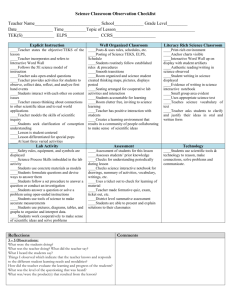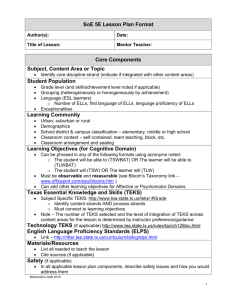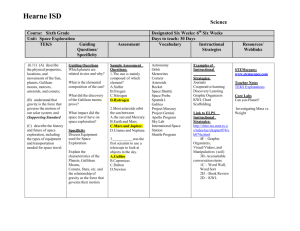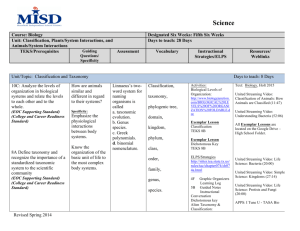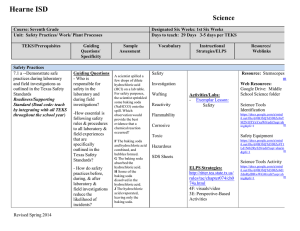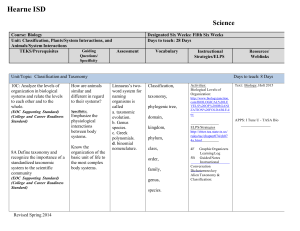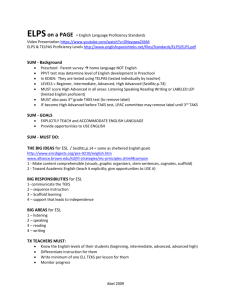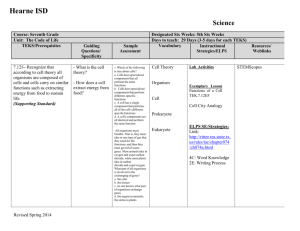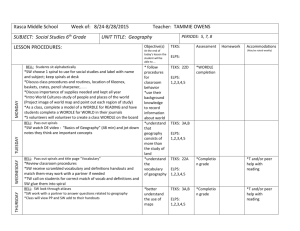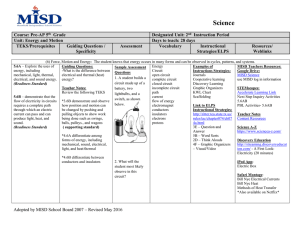Hearne ISD Science
advertisement
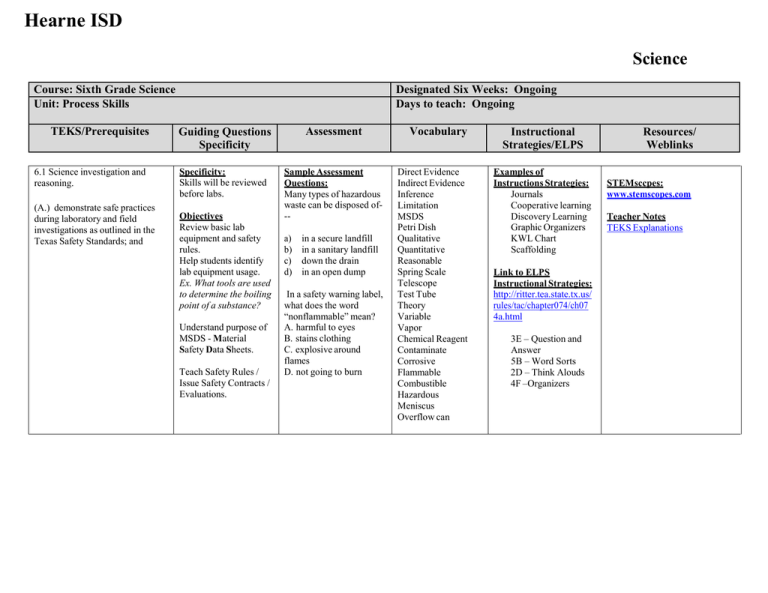
Hearne ISD Science Course: Sixth Grade Science Unit: Process Skills TEKS/Prerequisites 6.1 Science investigation and reasoning. (A.) demonstrate safe practices during laboratory and field investigations as outlined in the Texas Safety Standards; and Designated Six Weeks: Ongoing Days to teach: Ongoing Guiding Questions Specificity Assessment Specificity: Skills will be reviewed before labs. Sample Assessment Questions: Many types of hazardous waste can be disposed of-- Objectives Review basic lab equipment and safety rules. Help students identify lab equipment usage. Ex. What tools are used to determine the boiling point of a substance? Understand purpose of MSDS - Material Safety Data Sheets. Teach Safety Rules / Issue Safety Contracts / Evaluations. a) b) c) d) in a secure landfill in a sanitary landfill down the drain in an open dump In a safety warning label, what does the word “nonflammable” mean? A. harmful to eyes B. stains clothing C. explosive around flames D. not going to burn Vocabulary Direct Evidence Indirect Evidence Inference Limitation MSDS Petri Dish Qualitative Quantitative Reasonable Spring Scale Telescope Test Tube Theory Variable Vapor Chemical Reagent Contaminate Corrosive Flammable Combustible Hazardous Meniscus Overflow can Instructional Strategies/ELPS Examples of Instructions Strategies: Journals Cooperative learning Discovery Learning Graphic Organizers KWL Chart Scaffolding Link to ELPS Instructional Strategies: http://ritter.tea.state.tx.us/ rules/tac/chapter074/ch07 4a.html 3E – Question and Answer 5B – Word Sorts 2D – Think Alouds 4F –Organizers Resources/ Weblinks STEMsccpes: www.stemscopes.com Teacher Notes TEKS Explanations Hearne ISD Science Course: Sixth Grade Science Unit: Process Skills TEKS/Prerequisites 6.2 (A) plan and implement comparative and descriptive investigations by making observations, asking well-defined questions, and using appropriate equipment and technology; (B) design and implement experimental investigations by making observations, asking welldefined questions, formulating testable hypotheses, and using appropriate equipment and technology; (C) collect and record data using the International System of Units (SI) and qualitative means such as labeled drawings, writing, and graphic organizers; (D) construct tables and graphs, using repeated trials and means, to organize data and identify patterns; and (E) Analyze data to formulate reasonable explanations, communicate valid conclusions supported by the data, and predict trends. Designated Six Weeks: Ongoing Days to teach: Ongoing Assessment Guiding Questions Specificity Specificity: Review metric measurement: see activity using Liter, Meter and Gram. The Science Spot: Metric Mania Lessons Sample Assessment Questions: 1.Which of the following is an example of a scientific question? Review Celsius temperature scale. Know basic check points: Ex. 0oC - freezing point of 100oC boiling point of water 23oC - room temperature 37oC - human body temperature b) Guided Questions: How do you design and implement a testable experiment? If then…. statements? How do you collect data? What should a data table and graph look like? a) c) d) Is experimenting on white mice right or wrong? Should scientists make as much money as athletes? Does tanning harm the skin? Who is the most famous scientist in the world W2.hat conclusion can you draw from the data? Which of these is an observation that can be made from the illustration? When compared to a leaf that long, how much longer is the l above? A. 5 mm B. 18 mm C. 36 mm D. 500 mm Answer: B Vocabulary Hypothesis Conclusion Evidence Investigation Inquiry Instructional Strategies/ELPS Examples of Instructions Strategies: Journals Cooperative learning Discovery Learning Graphic Organizers KWL Chart Scaffolding Link to ELPS Instructional Strategies: http://ritter.tea.state.tx.us/ rules/tac/chapter074/ch07 4a.html 3E – Question and Answer 5B – Word Sorts 2D – Think Alouds 4F – Organizers Resources/ Weblinks HISD Teacher Resources: Wiki: Google Drive: www.google.comuse MISD log in information STEMsccpes: www.stemscopes.com Teacher Notes TEKS Explanations Hearne ISD Science Course: Sixth Grade Science Unit: Process Skills TEKS/Prerequisites 6.3 (A) in all fields of science, analyze, evaluate, and critique scientific explanations by using empirical evidence, logical reasoning, and experimental and observational testing, including examining all sides of scientific evidence of those scientific explanations, so as to encourage critical thinking by the student; 6.4 (A) use appropriate tools to collect, record, and analyze information, including journals/notebooks, beakers, Petri dishes, meter sticks, graduated cylinders, hot plates, test tubes, triple beam balances, microscopes, thermometers, calculators, computers, timing devices, and other equipment as needed to teach the curriculum; an (B) use preventative safety equipment, including chemical splash goggles, aprons, and gloves, and be prepared to use emergency safety equipment, including an eye/face wash, a fire blanket, and a fire extinguisher. Designated Six Weeks: Ongoing Days to teach: Ongoing Guiding Questions Specificity Why do I need to communicate my findings and how is it done? Assessment Sample Assessment Questions: 1.Which of the following instruments would be used to measure relative humidity? a) hydrometer b) barometer c) psychrometer d) thermometer 3.Which of the following activities would most likely require the equipment shown above? A. Catching fish in an aquarium B. Heating a mixture of two liquids C. Measuring outdoor temperatures D. Finding the mass of a rock sample Vocabulary Empirical evidence Logical reasoning Experimental observation Instructional Strategies/ELPS Resources/ Weblinks Examples of Instructions Strategies: Journals Cooperative learning Discovery Learning Graphic Organizers KWL Chart Scaffolding HISD Teacher Resources: Link to ELPS Instructional Strategies: http://ritter.tea.state.tx.us/ rules/tac/chapter074/ch07 4a.html Teacher Notes TEKS Explanations 3E – Question and Answer 5B – Word Sorts 2D – Think Alouds 4F – Organizers Google Drive: www.google.comuse MISD log in information STEMsccpes: www.stemscopes.com
